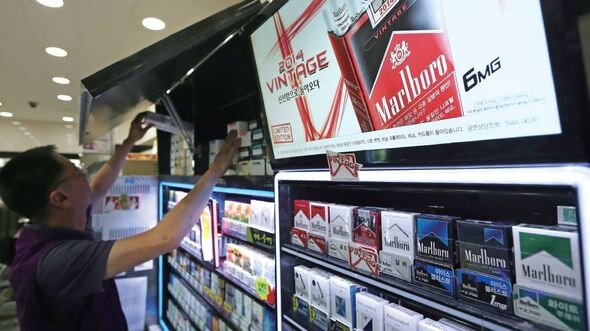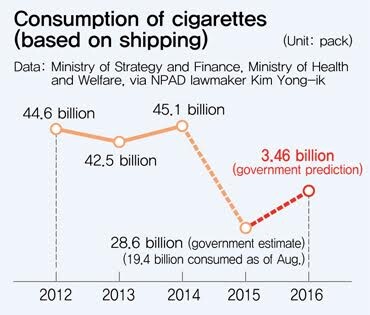hankyoreh
Links to other country sites 다른 나라 사이트 링크
Since price hike, cigarette consumption down but revenue way up

When the administration calculated its 2016 budget, it predicted that total cigarette consumption (shipping) would be 3.46 billion packs, or 600 million (21%) more than this year. Cigarette consumption has fallen by 34% since taxes per pack were raised by 2,000 won (US$1.67) at the beginning of the year, but revenues were projected to increase by 2.854 trillion won (US$2.38 billion) over the year, including national and local taxes.
Yet in the administration’s calculations, the projected 2016 shipments were down by just 21.2% from the annual average of 4.39 billion packs for the four years from 2010 to 2013. Critics are now charging that the goal of the cigarette tax hike was not to discourage smoking as claimed - but to raise more tax revenues.
According to data received from the Ministry of Strategy and Finance and Ministry of Health and Welfare by New Politics Alliance for Democracy (NPAD) lawmaker and National Assembly Health and Welfare Committee member Kim Yong-ik, the cigarette shipment totals that serve as a basis for the administration’s tax revenue projections and health insurance support levels predict sales of 3.46 billion packs next year. The number of 600 million won was higher than the projected sales of 2.86 billion for 2015.

The shipment numbers used to calculate revenue from cigarette taxes reflect the totals reported to the Ministry of Health and Welfare by tobacco companies for their required citizen health promotion surcharge payments, or the number of cigarettes actually shipped from factories and warehouses.
“When they raised cigarette prices by 500 won [US$0.42] in 2005, consumption dropped that year before rising again in 2006. Based on past examples, we calculated that there would be more sales next year than this year,” explained a Ministry of Strategy and Finance official.
“The number is still down a lot from before 2015,” the official added.
But the recent hike differs from the 2005 in a number of ways, including the size (2,000 won vs. 500 won) and the large-scale introduction of government policies to encourage people kick the habit with full-scale bans on smoking in restaurants and support for cessation treatments. South Korea is also scheduled to introduce its first warning images on cigarette packages in Dec. 2016.
Current trends suggest actual shipments in 2016 could actually be far higher than the administration’s projections. While shipments did drop sharply in the immediate wake of the tax hike earlier this year, levels stood at 340 million packs for July and 290 million packs for August. If the two-month average of 315 million packs per month holds up over next year, total shipments would reach 3.78 billion packs.
Meanwhile, cigarette tax revenues rose by 1.21 trillion won (US$1.0 billion) over 2014 levels for the first half of 2015, when shipments plummeted. If shipments for 2016 do come out to 600 million more than this year’s, they would translate into an increase of 111.35 trillion won (US$929 million) in revenue from 2015: 608.9 billion won (US$508 million) for individual consumption, value-added, and other central government taxes, and 504.6 billion won (US$421 million) in health promotion surcharge payments. Cigarette taxes account for 608.9 billion won (US$508 million) of the 2 trillion won (US$1.67 million) increase in projected national tax revenue from 2015 to 2016, or around 30%.
“The administration’s cigarette shipment projections for next year are basically an admission that the goal of raising taxes was to collect more money the whole time,” said Kim Yong-ik.
“It’s evidence that there’s no real commitment to anti-smoking policies,” he argued.
By Kim So-youn, staff reporter and Kim Yang-joong, medical correspondent
Please direct questions or comments to [english@hani.co.kr]

Editorial・opinion
![[Column] The state is back — but is it in business? [Column] The state is back — but is it in business?](https://flexible.img.hani.co.kr/flexible/normal/500/300/imgdb/original/2024/0506/8217149564092725.jpg) [Column] The state is back — but is it in business?
[Column] The state is back — but is it in business?![[Column] Life on our Trisolaris [Column] Life on our Trisolaris](https://flexible.img.hani.co.kr/flexible/normal/500/300/imgdb/original/2024/0505/4817148682278544.jpg) [Column] Life on our Trisolaris
[Column] Life on our Trisolaris- [Editorial] Penalties for airing allegations against Korea’s first lady endanger free press
- [Editorial] Yoon must halt procurement of SM-3 interceptor missiles
- [Guest essay] Maybe Korea’s rapid population decline is an opportunity, not a crisis
- [Column] Can Yoon steer diplomacy with Russia, China back on track?
- [Column] Season 2 of special prosecutor probe may be coming to Korea soon
- [Column] Park Geun-hye déjà vu in Yoon Suk-yeol
- [Editorial] New weight of N. Korea’s nuclear threats makes dialogue all the more urgent
- [Guest essay] The real reason Korea’s new right wants to dub Rhee a founding father
Most viewed articles
- 1[Column] Why Korea’s hard right is fated to lose
- 2Amid US-China clash, Korea must remember its failures in the 19th century, advises scholar
- 360% of young Koreans see no need to have kids after marriage
- 4[Column] The state is back — but is it in business?
- 5AI is catching up with humans at a ‘shocking’ rate
- 6Hybe-Ador dispute shines light on pervasive issues behind K-pop’s tidy facade
- 7Japan says it’s not pressuring Naver to sell Line, but Korean insiders say otherwise
- 8[Column] Can Yoon steer diplomacy with Russia, China back on track?
- 9S. Korean chaebols comprise 84% of GDP but only 10% of jobs
- 10Presidential office warns of veto in response to opposition passing special counsel probe act